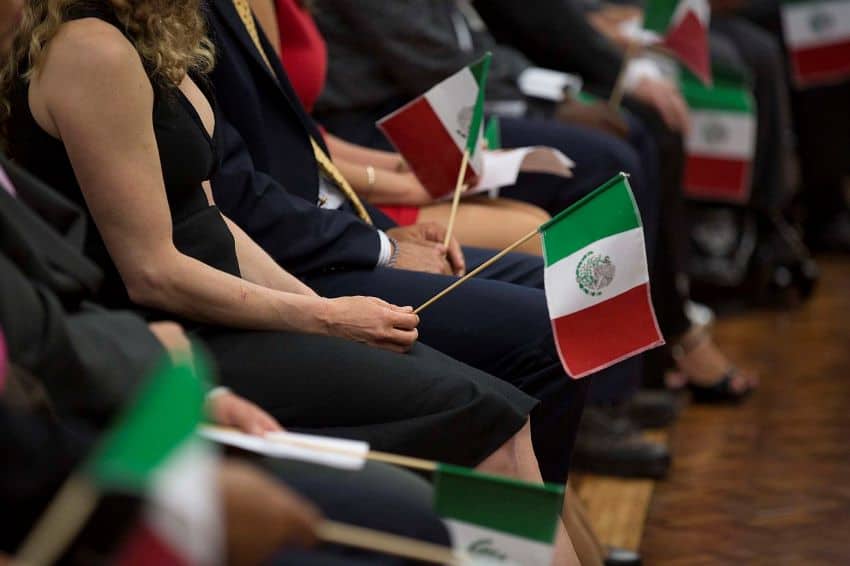In 1828, Alexander von Humboldt became Mexico’s first naturalized citizen. President Guadalupe Victoria issued a decree to recognize the German’s research work in the country.
Today, it is not necessary to get the president to naturalize you but still, a small percentage of permanent residents take this step. This is mostly due to Mexico’s immigration policies and the reasons why most people come to Mexico in the first place. According to the latest statistics on the Ministry of Foreign Relations (SRE) website, Mexico naturalized at least one person from 129 countries from all over the world from 2007 to the beginning of 2019. However, the total number was only 40,641, with the most being Colombians (5,726).
Not surprisingly, most of those naturalizations were of people from Latin America, in particular Cuba and parts of South America. Mexican law gives people from Spanish-speaking countries a slight advantage through a special category. In practice, however, it does not work the same for everyone in this category. Just about all of Europe is represented in SRE stats, but Spain is far in the lead, at three times over the country in second place, Italy. There is a long tradition of Spanish immigration to Mexico. One of the most recent waves was after the economic crisis of 2008 because it was easier for young Spanish professionals to find work here.
For non-Spanish-speaking people from the Americas, the United States leads with just over 2,000 naturalizations. But this is but a tiny fraction of the estimated 1 million U.S. citizens who live in Mexico, probably because many are retirees and because there is a strong aversion among Americans to modifying one’s citizenship or national identity. From Asia, most naturalizations are of people from China (1,528), followed by Korea (only 233). Numbers are surprisingly low considering the prominence of Chinese and Korean-owned businesses in parts of Mexico’s largest metropolitan areas.
Mexico’s immigration and naturalization laws reflect the country’s concerns about economy and identity. A simple example concerns foreign and naturalized football (soccer) players on professional and national teams. There was a strict limit on both from the 1950s to 2005. When the limit was dropped for naturalized citizens, teams began to help players get citizenship to free up spaces for other foreign-born players. This still causes controversy.

Categories for allowing naturalization include family relationships (spouse, child or being a direct descendant of a Mexican), residency and recognition of contributions to Mexican society. The requirements include an exam on Mexican history and culture and a Spanish proficiency test. Requirements also change from time to time. One of the most recent changes came in 2019, allowing same-sex married partners of Mexicans to immigrate and naturalize equally.
The immigration advocacy group Sin Fronteras has been a longtime critic of Mexico’s requirements, which they claim discriminate, particularly against Central Americans. One issue, it says, is that the system has favored professionals and works against those from very poor countries. The group also claims that the Spanish-language requirement can work against those from indigenous communities in Central America.
Immigration and human rights lawyer Ela Janeth Valentín Jackson, whose family migrated from Honduras to Mexico, agrees with this assessment. She notes that the current large wave of immigration from Venezuela is not only because of that country’s dire situation but also because the migrating Venezuelans tend to be educated, which gives them an advantage even if they come with absolutely no economic resources.
The benefits of citizenship include political participation, a Mexican passport, the national voter ID card, the right to avoid most interactions with immigration and the ability to own property in Mexico’s restricted zones on the coasts and borders. Naturalized citizens often state that they feel that they are treated better by bureaucrats when they use the national voting card for identification.
The main reason that most permanent residents do not seek Mexican citizenship is that the benefits do not outweigh the effort to get it. One anonymous foreign resident puts it this way:
“The process is complicated, and permanent residency allows me to live here with my family, so there is no urgency.”

I can vouch for this. I have been eligible for eight years and only now am starting the process of applying for naturalization. The initial procrastination was due to the requirement of getting an apostilled copy of my New York State birth certificate (a nightmare). Now it is the studying for the test, which got harder in the last two years.
There can be other problems as well. For those considering naturalization, the requirement to “renounce” birth citizenship may be troubling. It does not mean that you must get your original country to negate your status with them. It means that you declare to the Mexican government that while in Mexico, you are a Mexican citizen and only a Mexican citizen. Most countries will not offer consulate protection while you are in Mexico. There are a few countries, such as Germany, the Netherlands and Japan, that can have further problems with dual citizenship, so it is best to check with your embassy prior to the process.
Naturalized Mexican citizenship is kind of a second-class version. Unlike birthright citizenship, naturalized citizens must maintain their status. Naturalized citizens are forbidden from taking on yet another naturalized citizenship from another country, accept certain titles from other countries and cannot live outside of Mexico for more than five consecutive years. Naturalized citizens can vote but can run only for certain political offices.
Most who get it do so because their spouse or children are Mexican citizens. This is particularly true for those who migrated from countries that are economically and politically stable. For those coming from less stable countries, Mexican citizenship can provide security. I should also note that several respondents I talked to from the U.S. and the United Kingdom indicated that recent sociopolitical developments in their countries are making them take a second look at becoming a Mexican national.
In an informal survey I conducted, Bob C. and others I communicated with state that they feel that they are treated better by bureaucrats when they use the national voting card for identification. Karen A. adds that it is “cool too — seeing the looks on faces when I show my ID!”
SRE has a website that explains the details of the requirements and the process — in Spanish — since one of the requirements of naturalization is proficiency in the language. The expat information website Mexperience recently published its 2021 update of the Mexico Immigration Guide, which does cover citizenship requirements.
• Special thanks to Ela Janeth Valentín Jackson for helping me verify and update the information on naturalization. She is located in Cuernavaca and can be reached at [email protected].
Leigh Thelmadatter arrived in Mexico 17 years ago and fell in love with the land and the culture. She publishes a blog called Creative Hands of Mexico and her first book, Mexican Cartonería: Paper, Paste and Fiesta, was published last year. Her culture blog appears regularly on Mexico News Daily.
